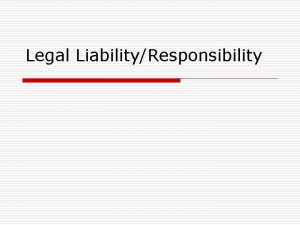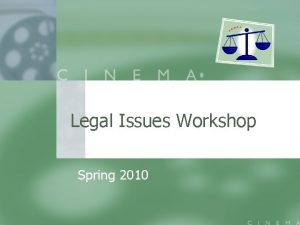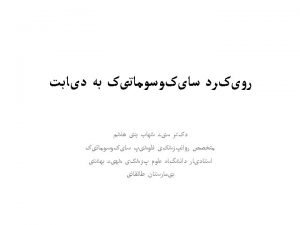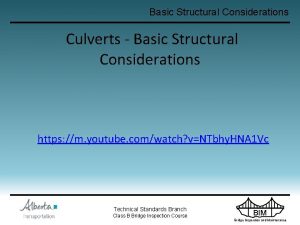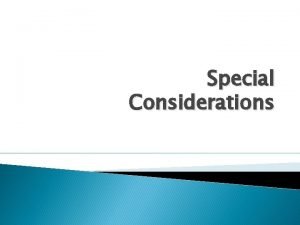Legal considerations L O What are the legal














- Slides: 14

Legal considerations L. O. – What are the legal considerations for the comic/graphic novel you will be developing?

Task 2: Planning for an original graphic novel or comic idea Learning Outcome 2: Be able to plan the production of an original graphic novel or comic

The checklist highlights that you needs to focus on the following areas: • Copyright • Intellectual property rights • Slander • Libel • Royalties • Violence • Offensive language/behaviour/ material • Representation • Health and safety

What considerations, relating to comics and graphic novels, do we know about…?

Copyright • The legal right for the producer of a product to have exclusive right to use it. • How might this affect your ideas?

Intellectual property rights • Legal rights that grant the owner of ideas, designs, trademarks, products, and so on, the exclusive use of the property • How might this affect your ideas?

Slander and libel • Slander – you could face a lawsuit if the media product is published containing information about someone that is untrue and damaging to their reputation. Slander involves making a false statement in the spoken word • Libel – carries the same legal implications as slander, and is in written form, through the use of imagery or radio broadcast • How might this affect your ideas?

Royalties • A payment made to someone who owns a particular asset for the right to use it • How might this affect your ideas?

Representation • How are you representing men, women, age, sexuality, race etc. • You must think about how these representations will be suitable for your comic/graphic novel and the target audience • How might this affect your ideas?

Health and safety • Ensuring your safety and the safety of others. What might be taken into consideration? • How might this affect your ideas?

Violence, offensive language/behaviour/ material • You need to ensure that you are conforming to the laws within the country the comic is being produced any countries that you might decide to sell your comic in • Are you focusing on things that could be considered offensive? If so, then what? Link to your influences and target audience needs. If not, why not?

Regulation • Comics in America used to be regulated by the CCA (Comics Code Authority). Most comics read were American, so this affected readers in the UK by proxy. The code ensured that children would not be corrupted by violence, bad language and sexual content • Comics used to be submitted to the CCA to ensure that they were suitable for audiences and would have their seal on the cover • Some of the bigger comic publishers started to use their own code and the CCA became defunct in 2011. Why do you think this happened?


How are comics regulated now? • Today, comics tend to self-regulate and content tends to be suitable for the comic’s target audience • What could you say about regulation and your comic?
 Mikael ferm
Mikael ferm Bioreactor considerations for animal cell culture
Bioreactor considerations for animal cell culture Azure landing zone considerations
Azure landing zone considerations Three considerations of societal marketing concept
Three considerations of societal marketing concept Design considerations for mobile computing
Design considerations for mobile computing Distobuccal border of mandibular denture
Distobuccal border of mandibular denture Dissect the broad area into sub areas
Dissect the broad area into sub areas Examples of consideration
Examples of consideration Cloud delivery models
Cloud delivery models Pricing considerations and approaches
Pricing considerations and approaches Spurt and shunt muscles
Spurt and shunt muscles What are the general considerations in machine design?
What are the general considerations in machine design? Collaboration design considerations
Collaboration design considerations Data warehouse considerations
Data warehouse considerations Research paper appendices example
Research paper appendices example


















